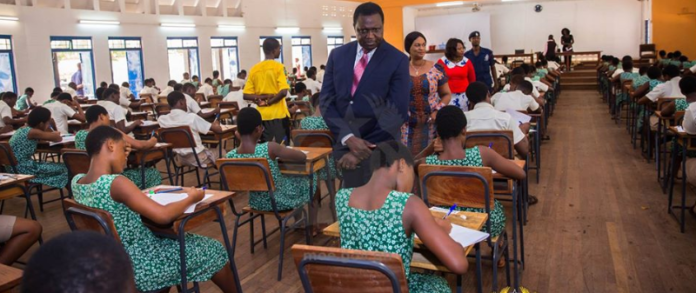
The West African Examinations Council (WAEC) has said that it can only determine if candidates who sat for this year’s West African Senior Secondary Certificate Examinations (WASSCE) cheated or not after the papers have been marked and an assessment of the results made.
WAEC has described several reports of widespread leakage of examination questions and answers on social media platforms as false saying the incident rather swayed students from a holistic learning approach.
Wendy E. Addy-Lamptey, Head of National Office (HNO) of WAEC, told the B&FT in an interview that: “There are a lot of ways that exams boards tackle cheating. When you suspect cheating there are softwares that we use and there are procedures that we undertake.
We have the standard fixing and grade award procedure and during that, we look at the question paper, we look at the question and we look at the statistics. Honestly, the thing that can tell us the truth as to whether cheating has gone on or not is the statistics. Once we get to the point of looking at the statistics, whatever we see, we follow up from there.”
When you look at every performance or every variable trait, it follows a certain curve, all things being normal. Scores behave similarly so if you watch the statistics and for some strange reason everybody is up there it tells you that something did not go on very well,” she added.
This year’s WASSCE was bedevilled with several reports of leaked papers – of which some have been admitted by WAEC – affecting the credibility of the exams. Many bodies including the National Union of Ghana Students (NUGS) and National Association of Graduate Teachers (NAGRAT) have expressed their displeasure over the matter and called for some stringent measures to deal with it; some have even proposed a cancelation of the papers.
But Mrs. Addy-Lamptey stressed that there are clear rules and regulations and procedures in place. “We cannot tell students to re-write but as an exam board we have several ways to deal with these issues.”
Rough Website
Mrs. Addy-Lamptey emphasised the stress the council is going through due to the activities of rogue websites and WhatsApp groups. Narrating their modus operandi during a press conference on the 2020 examination, she said: “Prior to dates set for the various papers to be written by candidates, some of these sites predicted questions and topics, others uploaded pictures of past questions.
Also, some managed to obtain snapshots of the actual question paper after the start of the examination, forwarded the same to be worked out and sent the solutions to candidates thus creating the desperate need for some candidates to send their phones to the examination hall to receive solutions.”
She added that this led to quite a number of mobile phone related cases of malpractice during examination; some other candidates used their visits to the washroom to pick up photocopied solutions which had been earlier deposited there on purpose for them.
“Digital dishonesty has become a threat to all examination boards globally. The council has engaged the security agencies i.e National Security, BNI and CID and provided them with a list of names and phone numbers by which these rogue websites and WhatsApp groups operate.
We are working closely with the security agencies who have assured us that they are tracking the perpetrators to clamp down on their activities. This, we believe will minimize their mischief and restore confidence in the validity and reliability of our examination and certificates,” she stressed.









